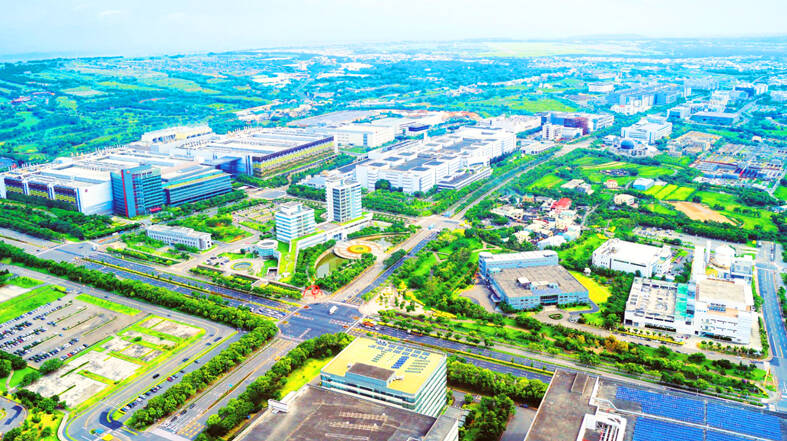The Ministry of the Interior yesterday approved a development project to expand the Central Taiwan Science Park (中部科學園區), paving the way for Taiwan Semiconductor Manufacturing Co (TSMC, 台積電) to build an advanced 1.4-nanometer fab next year.
The project is crucial for the nation’s semiconductor industry in terms of next-generation technology and capacity, the Central Taiwan Science Park Bureau said in a statement.
The bureau expects to hand over the land to interested semiconductor companies by the end of June next year, when the Taichung City Government completes land appropriation.

Photo courtesy of the Central Taiwan Science Park Bureau via CNA
Taichung Mayor Lu Shiow-yen (盧秀燕) earlier this month told reporters that TSMC had agreed to build an advanced fab, likely using 1.4-nanometer technology, in the expanded Central Taiwan Science Park after the chipmaker suffered a setback in October in building an advanced fab in the Longtan (龍潭) section of Hsinchu Science Park (新竹科學園區) due to strong opposition by local residents.
The bureau said that a majority, or about 76 percent, of the 89.75 hectares to be appropriated is owned by a golf course operator, adding that the central and local governments would work together to solve issues concerning the golf course employees and compensation to members.
Government agencies, including the Ministry of National Defense, own about 13 percent of the land, the bureau said.
If the new project moves forward smoothly, it would generate NT$485.7 billion (US$15.6 billion) in annual production value and create 4,500 jobs upon completion, the bureau said.
Several companies from the semiconductor supply chain have expressed an interest in building operations there, it said.
Separately, MediaTek Inc (聯發科) yesterday said it would work closely with TSMC to produce its new flagship smartphone chips using 3-nanometer technology next year.
“Leading-edge technologies are very complicated and it is difficult for the company to switch [foundry] partners,” MediaTek chief executive officer Rick Tsai (蔡力行) told reporters when asked if the smartphone chip designer is considering a second source, such as Intel Corp or Samsung Electronics Co.
MediaTek has been working with Intel to produce chips using the latter’s 16-nanometer technology, Tsai said.

NEW IDENTITY: Known for its software, India has expanded into hardware, with its semiconductor industry growing from US$38bn in 2023 to US$45bn to US$50bn India on Saturday inaugurated its first semiconductor assembly and test facility, a milestone in the government’s push to reduce dependence on foreign chipmakers and stake a claim in a sector dominated by China. Indian Prime Minister Narendra Modi opened US firm Micron Technology Inc’s semiconductor assembly, test and packaging unit in his home state of Gujarat, hailing the “dawn of a new era” for India’s technology ambitions. “When young Indians look back in the future, they will see this decade as the turning point in our tech future,” Modi told the event, which was broadcast on his YouTube channel. The plant would convert

‘SEISMIC SHIFT’: The researcher forecast there would be about 1.1 billion mobile shipments this year, down from 1.26 billion the prior year and erasing years of gains The global smartphone market is expected to contract 12.9 percent this year due to the unprecedented memorychip shortage, marking “a crisis like no other,” researcher International Data Corp (IDC) said. The new forecast, a dramatic revision down from earlier estimates, gives the latest accounting of the ongoing memory crunch that is affecting every corner of the electronics industry. The demand for advanced memory to power artificial intelligence (AI) tasks has drained global supply until well into next year and jeopardizes the business model of many smartphone makers. IDC forecast about 1.1 billion mobile shipments this year, down from 1.26 billion the prior

People stand in a Pokemon store in Tokyo on Thursday. One of the world highest-grossing franchises is celebrated its 30th anniversary yesterday.

Zimbabwe’s ban on raw lithium exports is forcing Chinese miners to rethink their strategy, speeding up plans to process the metal locally instead of shipping it to China’s vast rechargeable battery industry. The country is Africa’s largest lithium producer and has one of the world’s largest reserves, according to the US Geological Survey (USGS). Zimbabwe already banned the export of lithium ore in 2022 and last year announced it would halt exports of lithium concentrates from January next year. However, on Wednesday it imposed the ban with immediate effect, leaving unclear what the lithium mining sector would do in the